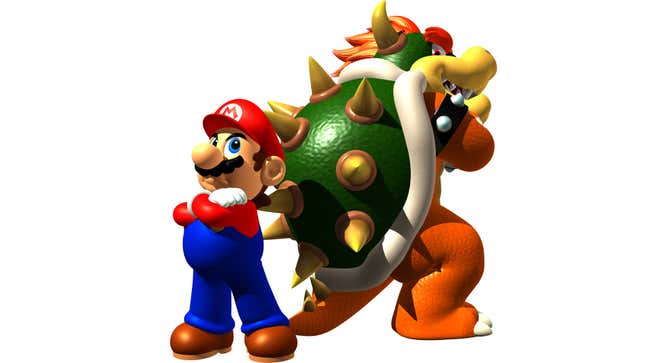
How do you evolve a franchise with an almost-static main character? You look to his antagonist: Bowser, King of the Koopas. Also known by his objectively superior Japanese name: Great Demon King Koopa.
Super Mario’s World is a look at the characters that turned the Mario franchise into a household name for 35 years.
Based on Nintendo’s own track record, each new Mario game carries high expectations. It’s easy to understand why: If they aren’t outright inventing or revolutionizing how video games themselves are played, they’re refining or perfecting an existing approach to game design. A new Super Mario title comes around once, maybe twice, a generation, and its 35-year dynasty is the company’s testament to how effective their approach has been.
Mario himself, however, doesn’t change that much. Mechanically and visually? Absolutely. But Mario, as his original “Jumpman” name said outright, is good for one thing: jumping. Mario games are about the joy of movement, and Mario is your joyful mover. Meanwhile Bowser, too, is a pure character. Mario is good for jumping, but Bowser spurs him to reach new heights.
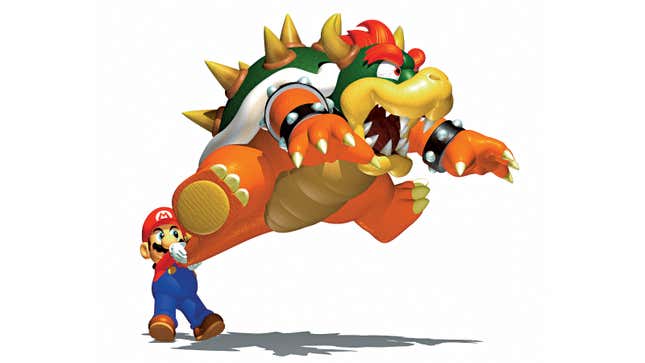
Both in-universe and out of it, Bowser is the driving force of every Mario title. He kickstarts each story by kidnapping a member of royalty. He usually defines the main gameplay gimmick by using it himself or forcing Mario to learn new skills to take him on. When Bowser helps cover an island in poison paint, Mario straps on a sentient water cannon; when the Koopa King steals Peach’s castle and flies to the center of the galaxy, our plumber learns to defy gravity.
Bowser is whatever a game needs him to be. But somehow, all of these disparate skills and personality shifts never feel deeply in conflict with each other. Combined, they make him the single coolest character in gaming. And that’s before we even scratch the surface of him being the only recurring parent in the entire Mario franchise.
In his first appearance, Bowser is pretty barebones. He mostly serves as a hopping brick wall at the end of each castle. By Super Mario Bros. 3, he is the ruler of an entire world (Dark Land) complete with a steampunk army of wooden tanks and propellor airships, access to mid-level wizardry, and a gang of seven loyal Koopalings. (They used to be his children, now they’re just an anime-style gang of minions with distinct personalities.)
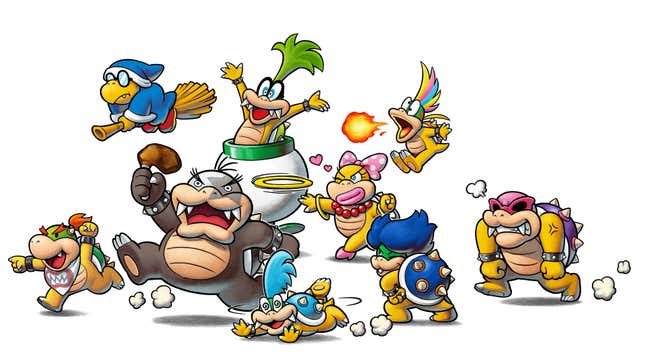
In Super Mario World he gets into mechanized enemies, introducing his Koopa Clown Car into the mythos. By Super Mario 64 he is both a master of dark magic, trapping all the residents of Peach’s castle in walls and paintings, as well as a deeply imposing physical presence, towering over Mario and splitting the ground beneath them with his footsteps.
Bowser is a necromancer, an expert in spacefaring technology and dark-matter physics, a military commander, a dictator, a single father, and the point man behind a series of daring global heists to steal the perfect items for his moon wedding. And that’s just in the main games.
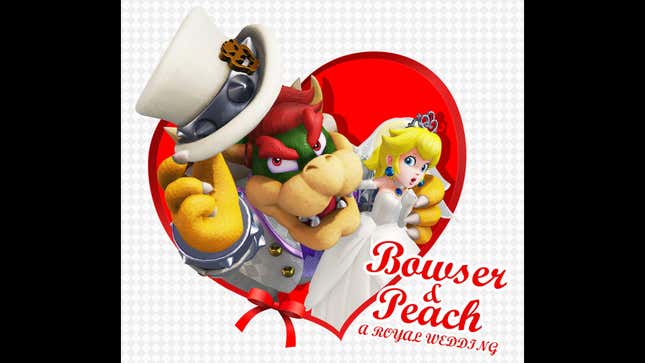
In any other medium, that list of actual things one character has done would be ridiculous. It would give Lex Luthor a run for his considerable money, and even comic book characters need the occasional continuity reset when things get a bit too zany. However, it works for Bowser because it gives Mario—and by extension us as players—an even bigger challenge to overcome. The better Bowser is, the better we are for defeating him.
That’s not to say he’s a blank slate of generic villainous villainy; at least, not always. With one huge exception (we’ll get to you in a minute, Sunshine), Bowser is portrayed as evil to the point of ruin in most Mario titles. Depending on what you make of Galaxy’s ending, he might have actually killed everyone in the universe. But there’s one strain of Mario spin-off games that looked at Bowser and made one of my favorite character choices in the history of stories: The Mario RPGs let Bowser be funny.
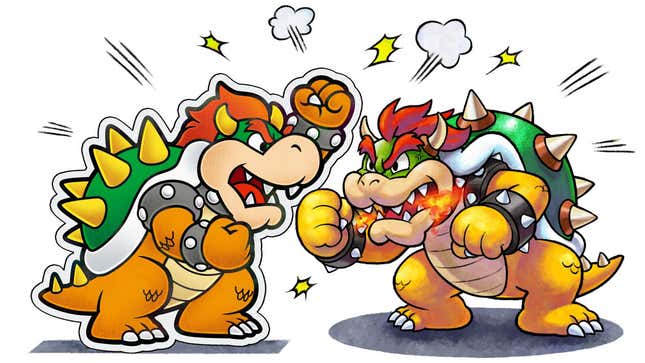
The opening of Super Mario RPG: Legend of the Seven Stars is perfect. Mario rushes to fight Bowser (again) and rescue Princess Peach (again). For the first time, Bowser speaks directly to Mario and the player. The two of them have an epic showdown atop a pair of goddamn chandeliers while a dope remix of his Super Mario Bros. 3 fight music plays (composed by Yoko Shimomura, no less). Their rivalry had never been this intense nor cinematic.
Then Mario beats him in under a minute, Bowser cries when he thinks no one is looking, and Peach is immediately kidnapped by a gang of darker, more competent villains. The rest of the game sets up a now-recurring dynamic in the RPG spin-offs: Bowser working alongside Mario (and for the only time, Peach) to get rid of interloper villains and restore his status quo of regular antagonist. We see him rally his dwindling troops to diminishing returns. We see him kiss a weird cake-loving viking, or Mario, or both.
Most of the Mario RPGs keep this quirk of his characterization, and it seldom gets old. But there does seem to be a limit to the charms of Comedy Bowser: the mainline games themselves.
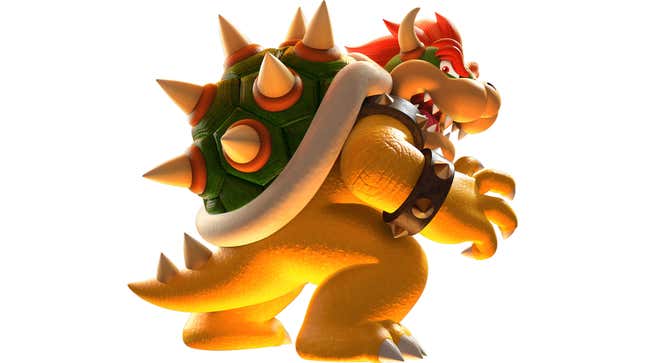
Super Mario games are fun and good-natured, but they’re rarely funny. The only time the goofy, bumbling version of Bowser appears as a villain is in Super Mario Sunshine, and it is weird. Put aside the fact that it’s the franchise debut of Bowser Jr., now retconned as Bowser’s only child. (And different from Baby Bowser, who is actually just Bowser as a delinquent child raised alone by his wizard-butler, Kamek. Bowser is Batman?) Let’s even ignore that Peach gets kidnapped because Bowser, scared of revealing the true identity of his child’s mother to his son, lies and says that Princess Peach is his mom and Mario is her captor. The weird, dopey, fully-voice-acted vibe of Sunshine Bowser is distracting because Bowser isn’t at his best. It’s not the right place for the Mario RPGs’ silly Bowser, as the story isn’t involved enough to match it.
Like all strong personalities, he needs to be used at the right time and in the right way. Comedy Bowser is great as a rival or a teammate, but doesn’t bring the intensity as a true villain. Dark Wizard Bowser works as a source of constant, static opposition in a straightforward platformer, but would feel like a shadow of himself in RPGs when he’s not allowed to let his personality shine.
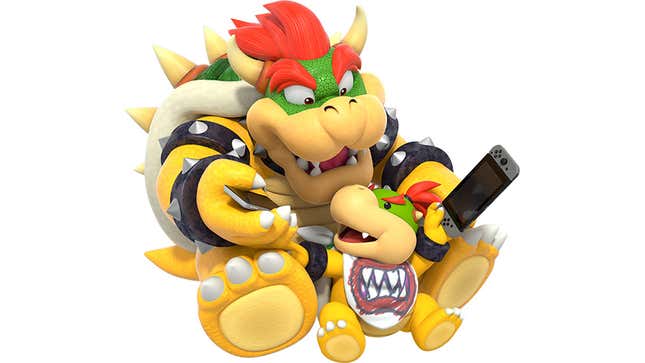
Both versions, interestingly enough, have embraced his most unique aspect: his fatherhood. Bowser Jr. is portrayed as an enthusiastic and tech-minded member of Bowser’s army in the main games, balancing out his dad’s more old-fashioned reliance on dark magic and airships. In the most recent RPGs, especially Paper Mario: The Origami King, Bowser’s status as a sometimes-competent warlord and a patient, supportive father is a huge part of his character arc. In a multimedia franchise owned by a corporation that approaches change in a cautious, measured fashion, Bowser just keeps growing.
In Mario’s universe, babies are literally delivered by stork. Monarchies are normal and just. Plumbing is universally subsidized. Things are simple. Bowser is anything but. He changes careers, he has a complex, evolving relationship with the people around him, and he has both personal and professional goals. He’s the type of guy that looks at a castle and says, “I could steal that.” And then he does.
In another story, one where he does less kidnapping and forced marriage, Bowser would be your favorite anime protagonist. Instead, he’s the perennial villain. The biggest turtle to be kicked around by Mario like all the rest. But we know he can take it. And he’ll come back bigger, weirder, and better on the other side.
Mike Sholars is a freelance pop-culture writer who believes that the best way to celebrate the things you love is to roast them relentlessly. He loves video games and anime. Follow him on Twitter @Sholarsenic.
.